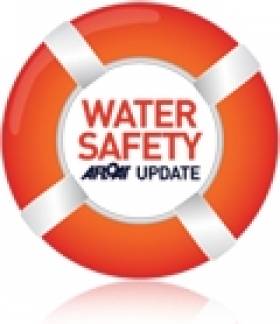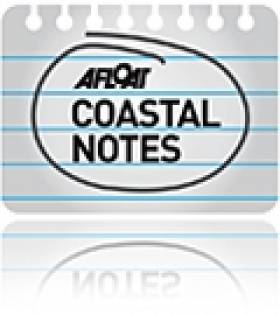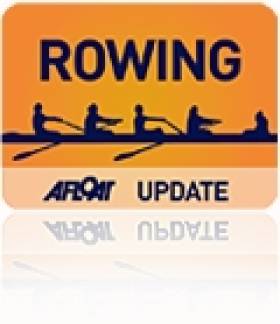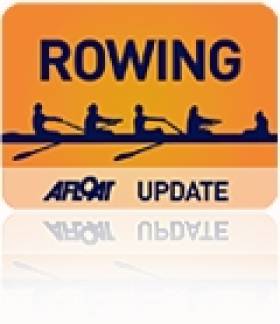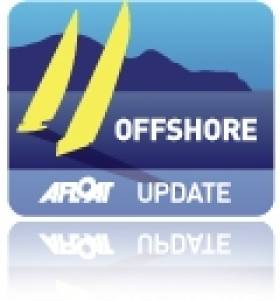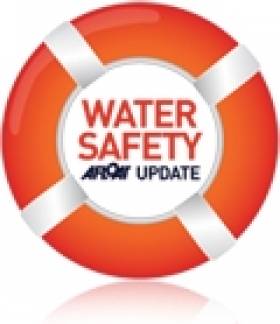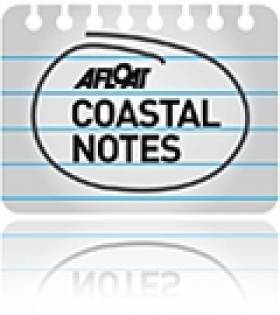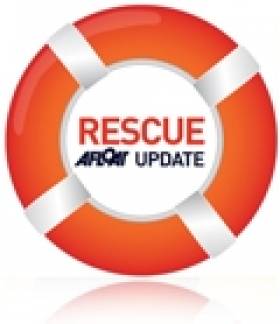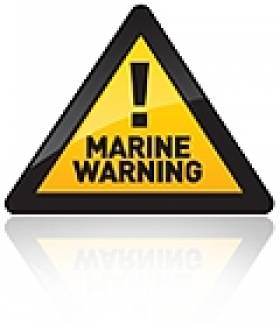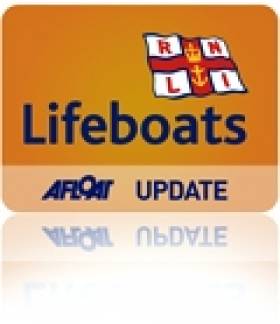Displaying items by tag: Cork
Rosslare RNLI Praises Emergency Caller Despite False Alarm
#WaterSafety - Rosslare RNLI has given credit to the quick-thinking member of the public who raised the alarm over what they believed to be a swimmer in difficulty - even though the call-out turned out to be a false alarm.
Lifeboats from Rosslare Harbour and Wexford RNLI were involved in the sea search on Friday evening (19 July) after a swimmer was reported to be in difficulty off Curracloe beach in Co Wexford.
The Irish Coast Guard helicopter Rescue 117 and two local fishing vessels were also involved in the search, which was stood down after an hour and 45 minutes upon coastguard request as no one was reported missing.
Speaking after the call-out, Rosslare RNLI deputy launching authority Dave Maloney said: "The member of the public who raised the alarm this evening deserves credit for doing so."
He added: "We would always encourage the public to alert the emergency services if they see anyone they believe to be in trouble or any signs of danger."
The message is particularly important in a fortnight that has seen a shocking 10 drownings around the island of Ireland - resulting in a big rise in emergency call-outs over the 2012 mid-summer period.
Elsewhere on the same day, the Ballycotton RNLI lifeboat was requested to help search the water off Ballinamona Strand in Ballycotton Bay, Co Cork, for a missing five-year-old girl.
The little girl was playing on the strand when her family lost sight of her. Emergency services were alerted and a search of the area commenced, but thankfully a short while later the little girl was located safe and well.
In other water safety news, the Irish Coast Guard has issued a public appeal for help locating a training mannequin that was lost in Galway Bay during an exercise off Blackhead in North Clare last week.
The Connacht Tribune reports that five coastguard mannequins were placed in the water to acts as people who jumped overboard from a ship fire - but only four were recovered afterwards.
Shares Tumble As Providence Plugs Dunquin Oil Well
#Oil - Providence Resources have plugged and abandoned an exploration well at the Dunquin North prospect off the Cork coast after striking more water than oil, as OilVoice reports.
The company's technical director John O'Sullivan confirmed the presence of "a potential residual oil column" which may indicate that any oil that was once in the reservoir has since leaked - though such weaknesses have been discovered elsewhere over the prospect.
"Notably, the separate Dunquin South build-up appears to have a thicker sea and lacks the significant fluid escape features seen further to the north," he said.
Providence chief executive Tony O'Reilly added that data from the southern explorations are encouraging "for the basin in general and are likely to intensify the already growing industry focus on this emerging hydrocarbon exploration arena."
According to The Irish Times, Providence shares fell the most in over a year of Dublin trading at news of the Dunquin North disappointment.
Gráinne Mhaol Win Men's Four at Irish Rowing Championships
#IrishRowingChampionships: Alan Martin won his eighth senior fours title as Gráinne Mhaol laid down a marker for the senior eights on the first day of the the Irish Rowing Championships in Cork today. The experienced crew of Martin, Dave Mannion, Cormac Folan and James Wall were quickly joined by another Gráinne Mhaol winner in Niall Kenny, taking his second successive title in the lightweight single sculls.
Trinity brought their tally of wins up to three when the men’s novice eight and women’s intermediate eight added to the earlier win by the women’s intermediate pair. Three Castles matched their surprise win in the men’s senior double with a more predictable victory in the women’s double by Eimear Moran and Helen Walshe.
Skibbereen’s junior women’s four gave them their only Championship win of the day, while St Joseph’s of Galway took the junior men’s eight – their third in-a-row.
Irish Rowing Championships, National Rowing Centre, Farran Woods, Day One (Selected Results; Finals)
Men
Eight, Junior: 1 St Joseph’s 6:49, 2 Portora 6:54, 3 Neptune 6:58. Novice: 1 Trinity 6:50, 2 UCD 6:56, 3 UCC 7:01.
Four – Senior: 1 Grainne Mhaol (D Mannion, A Martin, C Folan, J Wall) 6:51, 2 St Michael’s 6:59, 3 UCD 7:00.
Intermediate, coxed: 1 UCC 7:14, 2 NUIG A 7:20, 3 Trinity A 7:22.
Sculling, Double – Senior: 1 Three Castles (R Corcoran, E Grigalius) 7:09.86, 3 Commercial 7:17.43, 3 Skibbereen 7:17.51.
Single – Senior Lightweight: 1 Grainne Mhaol (N Kenny) 8:09, 2 Clonmel (A Prendergast) 8:19, 3 Skibbereen (A Burns) 8:30.
Junior 18: 1 Shannon (C Carmody) 8:43, 2 St Michael’s (O’Malley) 8:48, 3 Belfast BC (McKillan) 9:05.
Women
Eight, Intermediate: 1 Trinity 7:47, 2 Galway RC 7:49, 3 UCD A 7:50.
Four – Senior: 1 Cork/NUIG (F Judge, M O’Neill, A Wickham, L Dilleen) 7:33.22, 2 Skibbereen/Killorglin 7:33.52, 3 St Michael’s 7:25.21. Novice, coxed: 1 Commercial 8:11, 2 NUIG 8:14, 3 Queen’s 8:24. Junior: 1 Skibbereen 8:18, 2 Cork BC 8:29, 3 St Michael’s 8:40.
Pair – Intermediate: 1 Trinity (G Crowe, S O’Brien) 9:22, 2 St Michael’s 9:42, 3 Commercial 9:47.
Sculling, Double – Senior: 1 Three Castles (H Walshe, E Moran) 8:13, 2 St Michael’s 8:25.
Junior: 1 Belfast BC (J English, B Jacques) 8:21, 2 Cork BC 8:32, 3 Castleconnell 8:41.
#IrishRowingChampionships: The first session of senior finals at the Irish Rowing Championships started with a tremendous win for the women’s four of Frances Judge, Marie O’Neill, Anna Wickham and Lisa Dilleen from NUIG/Cork Boat Club. The Skibbereen/Killorglin four headed them in the middle stages of the race but Cork/NUIG fought back into the headwind and pipped their rivals by .3 of a second.
In very warm and clear conditions at the National Rowing Centre in Cork, the titles were spread widely. Shannon’s Conor Carmody won the men’s junior single sculls, seeing off a good fight by David O’Malley of St Michael’s; Bridget Jacques and Jasmine English of Belfast Boat Club were clear winners of the junior double sculls; Gill Crowe and Sally O’Brien, who are lightweights, brought the women’s intermediate pair to Trinity with plenty to spare; UCC and Commercial had good wins in the men’s intermediate coxed four and the women’s novice coxed four respectively.
Amongst the most impressive winners were Eimantas Grigalius (27) and Ryan Corcoran (35) of Three Castles. They powered well clear of Commercial and Skibbereen by the finis to win the first Irish Championship for both of them.
Irish Rowing Championships, National Rowing Centre, Farran Woods, Day One (Selected Results; Finals)
Men
Four – Intermediate, coxed: 1 UCC 7:14, 2 NUIG A 7:20, 3 Trinity A 7:22.
Sculling, Double – Senior: 1 Three Castles (R Corcoran, E Grigalius) 7:09.86, 2 Commercial 7:17.43, 3 Skibbereen 7:17.51.
Single – Junior 18: 1 Shannon (C Carmody) 8:43, 2 St Michael’s (D O’Malley) 8:48, 3 Belfast BC (G McKillan) 9:05.
Women
Four – Senior: 1 Cork/NUIG (F Judge, M O’Neill, A Wickham, L Dilleen) 7:33.22, 2 Skibbereen/Killorglin 7:33.52, 3 St Michael’s 7:25.21. Novice, coxed: 1 Commercial 8:11, 2 NUIG 8:14, 3 Queen’s 8:24.
Pair – Intermediate: 1 Trinity (G Crowe, S O’Brien) 9:22, 2 St Michael’s 9:42, 3 Commercial 9:47.
Sculling, Double – Junior: 1 Belfast BC (J English, B Jacques) 8:21, 2 Cork BC 8:32, 3 Castleconnell 8:41.
Missing Solo Sailor Airlifted To Cork Hospital
#Offshore - BBC News reports that a sailor who went missing last week during a solo voyage from Plymouth to Portugal has been located and airlifted to hospital after falling overboard.
The 66-year-old man set off last Monday 10 June but apparently suffered chest injuries during the first night.
Falmouth Coastguard has difficulty contacting the man to determine his position but he was eventually found some 225km off the Isles of Scilly. He was later transported by helicopter to Cork for treatment.
#Drowning - Three drownings over the weekend have underlined the importance of safety on the water during the current sunny spell.
In Galway, residents of Moycullen were mourning the loss of a Lithuanian man who drowned while swimming with friends in Ballyquirke Lake on Saturday evening 8 June, according to Galway Bay FM.
And RTÉ News reports of a similar incident in Cork in the early hours of this morning 10 June, in which a 21-year-old man drowned after getting into difficulties in the River Lee near Ballincollig.
The young man is also believed to have been swimming with friends after another hot day across the country, according to The Irish Times.
Elsewhere in Cork, RTÉ News says a 17-year-old has died after drowning in the River Blackwater.
Earlier it was reported that the teen was in a serious condition after getting into difficulties while swimming with friends at a bathing spit known locally as Lisheen Bridge, and had been in the water for some time before he was recovered.
#DeepKinsale - Fastnet Oil & Gas believes that its Deep Kinsale Prospect in the Celtic Sea could hold an incredible bounty of more than two billion barrels of oil.
As Proactive Investors reports, the Irish-headed oil exploration firm says an independent assessment of its prospect in the waters south of Cork estimates 2.365 billion barrels of oil in place.
Fastnet executed its exclusive option on the prospect earlier this year, and recently completed a 3D seismic survey of the area, the data from which will enable the company to identify oil reservoir 'sweet spots' for the best drilling results.
“Deep Kinsale is a large anticlinal structure, which has the potential to contain a significant oil accumulation directly beneath the producing Kinsale gas field and the two platforms, in the Celtic Sea,” said John Craven, founding Fastnet shareholder.
“This new 3D seismic is a key de-risking component necessary for the planning of an optimal drilling campaign."
The full operational update from Fastnet Oil & Gas is available HERE.
As previously reported on Afloat.ie, Fastnet Oil & Gas has been awarded a new licensing option elsewhere in the Celtic Sea in the area know as East Mizzen.
Navy Tows Stricken Norwegian Yacht To Shore
#Rescue - RTÉ News reports that a Norwegian couple have been rescued after their yacht suffered damage off the south coast.
The vessel sailed by the couple in their late 60s apparently dismasted some 160 miles off the Cork coast en route from the Azores to the Shetland Islands.
They were discovered by a passing fishing trawler early yesterday (21 May) and assisted last night by the Naval Service vessel LE Aoife, which is currently towing the stricken yacht to Castletownbere.
Lt Captain Erica Downing of the LE Aoife told RTÉ that the couple were "extremely lucky" to be spotted by the French fishing boat, having not seen any other sea traffic the previous fortnight.
RTÉ News has more on the story HERE.
Marine Notice: Kinsale Pier Extension
#MarineNotice - Cork County Council is due to commence a 15-metre extension of the Town Pier in Kinsale in Co Cork.
The works are due to take place from this week till early December 2013, and will comprise the excavation of the sea bed from a pontoon barge (barge to be confirmed) for the installation of a mass concrete base and pier walls (15m x 30m).
Divers will be deployed throughout the underwater works. Hydrographic surveying will be carried out at intermittent stages throughout the works. Buoys will be deployed to mark the works area around the pier.
The commercial berth and north berth of the pier will remain operational throughout the works.
For further details of the works area see Marine Notice No 21 of 2013, a PDF of which is available to read or download HERE.
Koda The Husky Rescued By Quick-Thinking RNLI Crew
#RNLI - Two volunteer crew members from Kinsale RNLI came to the rescue of a husky dog who had a dramatic fall off a cliff near the Co Cork village recently.
Koda, a pedigree husky, was inspecting the coastline around Sandycove when she got too close to the edge and slipped over the 30ft cliff.
The dog landed in water with a strong current that swept her out to sea despite her desperate struggles to reach the shore. She managed to get herself back on a ledge by which time the alarm was raised and volunteer lifeboat crew were on their way.
A jagged reef also meant that Kinsale RNLI’s inshore lifeboat couldn't get close enough to help drag the struggling dog from the water.
However, Kinsale RNLI volunteers Nick Searls and Ian Fitzgerald were at the scene within minutes, and realised the danger facing the terrified dog.
Searles dived into the sea and swam over 60 metres to reach the animal. He managed to attach a harness and was able to swim slowly back to shore, dragging the weakened Koda with him. He was then assisted by safety line out of the sea by Fitzgerald.
Koda was immediately taken to a Kinsale vet, who confirmed that despite being exhausted and shocked by her ordeal, the dog was none the worse for wear.
In other news, Donaghadee RNLI assisted two men on board a yacht which got into difficulty off the Co Down coast yesterday morning (Tuesday 7 May).
The volunteer lifeboat crew was requested to launch at 9.50am by Bangor Coastguard to go to the aid of a yacht which had ran aground.
The 30ft yacht with two people on board had gone aground on rocks at the entrance to Donaghadee Marina.
With the help of another vessel, the lifeboat crew was quickly able to get a tow line to the yacht and pull it off the rocks.
The yacht, which had sustained some damage to its rudder, was able to make its way safely into the marina.



























